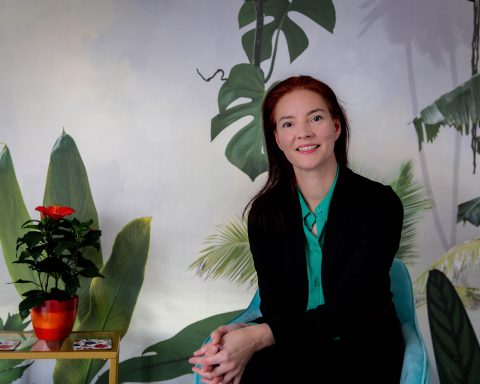A conversation on the Leipzig Expats Facebook page dealt with culture shock or problematic ways of thinking people experience when they adapt to a new culture. This interaction gave me the idea to talk more in-depth about culture shock and mental health. It inspired me to interview Demetris Nicolaides, a local expat psychotherapist, on their interplay.
Here is our interview, from his practice one beautiful warm spring evening.

Demetris, maybe you can tell a little bit about what you’re doing here in Leipzig.
Thank you for inviting me to speak about such an important topic. I’m from Cyprus and I came to Leipzig about a year ago. I’m a psychologist and I provide mental health support mainly to expats who find English a more comfortable language in which to express themselves, and in Greek which is my first language.
What type of therapy do you offer?
I combine different scientifically proven therapeutic approaches like CBT (Cognitive Behavioral Therapy), psychodynamic/psychoanalytic and humanistic (person-centered) therapy, depending on the problem presented and what works best for the client. I don’t restrict myself to a specific orientation because I believe that every case is different, so I try to adapt to each case.
The most important therapeutic skill is empathy.
For the next interview question, let’s break down the concept of culture shock a little bit.
When I move to a new country, that’s fundamentally a new experience: It requires adjustment just like starting university, finishing university, starting a new job, getting married, any new event in your life. Can you explain what adjustment is and the things that can go wrong?
I think what defines adjustment is the ability to be able to embrace something new. In order to do that, of course, you have to be open to new experiences and knowledge, and challenge the belief that whatever you know and whatever you experienced so far is the one single truth.
That’s so important. Adjustment is basically a process of learning and you’re not going to learn if you believe you already know.
Yes. Adjustment is a challenge, therapy is a challenge, growth is a challenge. One of the most difficult challenges I see for some expats is the fact that they spent 20-30 years sometimes in a single country and culture with specific traditions, beliefs, lifestyles, and they grew up in an environment which made them think that theirs is the correct way of living and understanding the world.

So if you come into a situation of living in a new country with the mentality that your way is right…
…you’re going to have a problem, big time.
You’re basically just building a booby trap for yourself, right? Because nobody in Germany or any country is waiting around, trying and wishing to be more American, or more Greek or Spanish or whatever.
For example, we come with the idea that people should chat a lot, let’s say. But in Germany you’re not supposed to talk a lot. So then you go to a shop, the person says the bare minimum to you, sells you your stuff and you go. What’s your emotional experience going to be if you think it’s normal and good and proper for people to chat?
Well, you’ll probably think that Germans suck. This is called “overgeneralization” and it’s one of the most common cognitive distortions. Then of course “catastrophization” follows with perceptions such as “everyone sucks,” “I’m in such a terrible country,” “I want to go back,” ”why did I do this,” “this is a big mistake,” etc. You’re going to call your parents, your siblings, your friends, and you’re going to complain how messed up it was to move to a new country. This is an example of culture shock.
This shock could shake your world and challenge your beliefs and ways of thinking, and show you that the world is not a black and white place.
That sounds like one thing that helps people to adjust is gaining maturity, and I know I’m going to get angry reactions from people out of this.
I don’t mean that you are immature if you have problems adjusting. That’s only human. But as you adjust, you will grow in maturity and you will be able to realize that everyone does things in their own way.
Without adversity there is no growth. Growth demands a hell of a lot problems, challenges, mistakes, failures, and pain.
I think what we have to add to that, to make it more precise, that you can have difficulties and just drink, right?
For sure! *Laughing*
Or you can have difficulties and just group together with people from your home country and complain the whole time. To grow in response to a challenge, you have to face the fact that you don’t understand what’s going on and you need to adjust and activate creativity and intelligence and problem-solving in order to figure out how to live in the new environment.
Yeah, that sounds like a really good plan, but everyone has their own journey and their own timing, so the process is different from person to person. Of course you will fall many times. Knowledge is not enough to grow. It’s all about hard work.
The road to growth is not straight. There are ups and downs. Even losing hope is sometimes part of the process. Our life is like a graph. What we should pay attention to is not those moments where we are up or down, but to the whole journey, to the average growth.

When you talk about practice and work, what are some practical things or some homework that can help expats to adjust better?
One of the first things you could do even before moving to a new country is to educate yourself about the whole concept of moving to a new country, and about the culture of the country you are moving to.
I’m astonished sometimes at the number of expats who have not educated themselves about culture shock and about the whole concept of different cultures.
Maybe that’s a bit abstract, but it helps to have terminology and vocabulary for what you’re going through, to be able to say “Oops, the honeymoon phase just ended. Now I’m in a phase of disorientation and soon I will enter the phase of adjustment and this is a natural process and I have to just keep going.” If you have that kind of map in your head, rather than being sort of angry and overwhelmed and disoriented all the time, it can be a great help.
Learning about the country helped me a lot because I was very ambitious with my German exams. I took courses in German literature and I did an exam where you had to read a bunch of German novels, and that suited me because I enjoyed literature. So I could combine my personal interest with the necessities of adjustment and find ways to connect to the culture that way, and then I could learn more about the German way of seeing the world and why things are how they are.
I suppose for some people, if they are into sports or they have kids or like music, joining a group with shared interests can really help.
Certainly. But before you even start thinking about activities and tasks, have some time to breathe and be mindful of where you are, why you came to this country. Try to be excited rather than anxious.
Excitement and anxiety stimulate similar hormones. Therefore, it’s a matter of interpretation.
So, you can approach the new situation with excitement and an attitude of “wow, I want to meet new people, I want to get to know new stuff, I want to search for things to do that I couldn’t do back in my country.” If you have this mentality, you won’t have the need to follow guidelines and tasks, because adjustment will be a much easier job for you and everything will come naturally.
Self-awareness, mindfulness and positivity are the most powerful tools you can have.
Suppose I like to sing in a choir and I join a German choir but I have this attitude of judgement and negativity, then I’m only going to be angry that it’s not my old choir from home.
Definitely. You could be in paradise and still feel like you are in hell. It’s all a matter of perspective and interpretation. Happiness doesn’t come from your environment, but from the quality of your thoughts and beliefs.
Your beliefs will affect how you think and your thoughts will affect how you feel and your feelings will affect how you behave and in the long term, how you live. If you want to change how you feel about living in Germany, you must be ready to challenge your own beliefs and ways of thinking.

That’s so important and that’s where the learning comes in. So I can identify my beliefs, I can challenge them, I can experiment, I can play a little bit and see what other beliefs I might try on to see how to get along. So your mentality, your beliefs, your way of framing and interpreting the situation, control your experience.
Some people are going to be grumpy about that and say “Oh great, so it’s all my fault. Thanks a lot, Demetris.”
*Laughing* Responsibility is freedom. Self-blame is not. It’s one thing to feel responsible to change your life and it’s another to constantly blame and punish yourself all the time because you are not there yet, because you don’t meet your expectations. Most people who take a look at their past selves will realize that now they are more mature and stronger.
One option is to start criticizing yourself saying, “I was so stupid back then, what a jerk I am, what was I thinking, how is it even possible to make such a horrible mistake, how did I mess up my life so much?” Then you end up feeling like a worthless piece of shit.
The second way of approaching the situation is “Oh my God… look how much progress I made, how much stronger I am now, how much I learned from my mistakes.”
Both ways of thinking are possible. The problem is that many people fall into the first trap.
Most people who talk bad about themselves don’t realize that the judgmental voice in their head is not theirs. They borrowed it from their parents and they had it in their heads for so many years that they now can’t distinguish it from their genuine voice anymore.
That means that in the situation of adjusting to life in Germany, people’s history with their family, their problems with anxiety, self-esteem, whatever, are going to be coming up.
The first few months I arrived in Leipzig, I remember how easily I could see parts of my parents in my behavior. It never happened to me before and it was shocking to me, because I was proud of my self-awareness.
Living in a new country can be really challenging but beneficial at the same time. It can lead to great self-awareness if we are ready to accept parts of ourselves that we don’t really like. To know yourself, you must have the courage to accept yourself. Many expats think that the problems and worries they have began after they moved to a new country. This is rarely true.
It’s easy to feel like, “I am experiencing anxiety, depression or whatever since I came to Germany, therefore Germany is the cause.”
Exactly. But it can’t be explained by a single cause. Most of the time it’s a correlation of different factors.
Most probably you already had your demons before arriving in a new country. But your demons travel with you. It’s just that your demons started having a party after you moved.
Oh yes! So culture shock is a demon party but those demons are yours. They are not German demons, they are your demons.
That’s right. Our brains love easy explanations. They work like that in order to save some space and energy. But many times this simplified way of thinking can be unrealistic, problematic and lead us to bad decisions. Similarly, it’s much easier to blame everyone and everything else instead of trying to understand our role in our unhappiness.
So let’s summarize a few points to see if I paid attention.
The willingness to be curious, to ask questions, to experiment, to play, to try to find out how the things in front of you work and also lighten up a little bit about your national identity, your home culture and challenge the assumption that the way you do things is the right way… you have to come with a child’s mind in a way. Could you say that?
Yes, of course. When we were children, we used to ask many questions, we were excited about learning new things and we were less biased. We need this excitement, thirst of knowledge and growth, and openness.

That brings us to another takeaway, which is the importance of interpretation and framing.
We are responsible for our thoughts and our behavior and that means that we have to reflect on them and be aware of them, because the uncomfortable truth is that I will generate a terrible experience for myself in any country if I go into a situation thinking that nobody wants me here, people think I’m stupid, etc.
Sure. We must evaluate the validity of our beliefs and thoughts before explaining why we are unhappy and making hasty judgments about the environment or the people. We must be open to including the possibility that we may also be responsible for our unhappiness – without being too judgmental to ourselves, of course.
Which brings us to: blaming everybody and everything. We don’t talk about self-blame a lot in the expat community, but I think you are right. People do blame themselves when they come here and they have a hard time.
And then I think that the biggest sort of moment for me was the idea that you bring your demons with you. And the experience of uncertainty and novelty entailed by being in a new country are going to invite those demons to come out and party.
Yes, that’s a feature of any significant challenge in life.

Can you also share some tips that you usually recommend to expats?
- Be mindful. Always remind yourself why you came here and focus on your goals. At the end of the day it’s your choice and your life. Try to live in the here and now. Meditation, breathing techniques or a walk in nature can help you to slow down and reflect.
- Self-care. For example, exercise, sport, hobbies and interests, regular sleep times, keeping your living environment clean and organized, eating healthy, also meditation, meeting friends, etc.
- Having a daily plan with goals and realistic expectations.
- Meet with other expats, share your own experiences and struggles and also learn from them. Try to make new friends. Don’t get over-focused on the friends you have in your home country. Surround yourself with positive people who like living in this country, and try to learn from them and get inspired.
- Don’t give up easily. Every beginning is hard. Think about the problems you will face as a challenge, which allows you to grow and get stronger, rather than as misfortunes and failures. Believe in yourself. Eliminate self-doubt.
Thank you so much for this interview. I think it will be a great resource.
It was a pleasure talking with you. Thank you for this opportunity.









